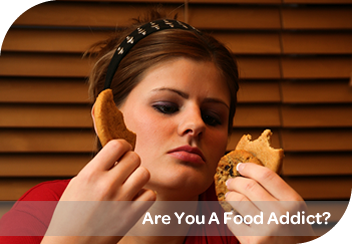Part 1 of 3
The following three-part series features guest posts by Janis Jibrin, M.S., R.D., and Dr. Barry Sears, and are featured in the Healthy Eating Section.
In the first post, “Are You a Food Addict?” by Janis Jibrin, M.S. R.D., lead nutritionist at BestLife, it provides a food questionnaire to find out if you may have a food addiction, and Janis shares helpful strategies to help overcome it. In her next post, “Foods that Fight Fat,” Janis explains which foods have an increased thermic effect which can help with weight loss.
And finally, Dr. Barry Sears, creator of the Zone Diet and The New York Times best-selling author, addresses “What is Anti-Aging?”
Are You a Food Addict?
By Janis Jibrin, M.S., R.D.
Part 1
Could you be addicted to food in the same way people become dependent on alcohol or drugs? If you experience intense food cravings, have lost control over food, and have felt agitated and/or anxious when you avoid certain foods, the answer could be yes.
Recently, we shared the story of Carol, a woman who battled and overcame a food addiction. This week, we’re offering a list of questions to help determine if you might have a food addiction, as well as tips on how to overcome it.
Food Addiction Questionnaire
This quiz, though not scientifically validated, helps clue you in to whether you’re addicted to food. It’s loosely adapted from a longer questionnaire (which is scientifically validated, but should be scored by a clinician), developed by Ashley N. Gearhardt, M.S., a clinical psychology doctoral student at Yale University in New Haven, Connecticut.
If you answer “yes” to all of these questions, there’s a high likelihood you have a food addiction. If you answer “no” to every question, it’s very unlikely that you’re addicted to food. Anything in between could possibly mean that you’re addicted.
- When I start eating certain foods, I end up eating much more than planned.
- I eat to the point of physical illness.
- I want to cut down or stop eating certain kinds of foods.
- When certain foods are not available, I will go out of my way to obtain them.
- At times, I consume certain foods so often or in such large quantities that I eat food instead of working, spending time with my family or friends, or engaging in other activities I enjoy.
- My food consumption has caused significant psychological problems, such as depression, anxiety, self-loathing or guilt and/or physical problems (or made a physical problem worse).
- I keep consuming the same types of food or the same amount of food despite my emotional and/or physical problems.
- Over time, I’ve found that I need to eat more and more to get the feeling I want, such as reduced negative emotions or increased pleasure.
- I’ve had withdrawal symptoms, such as agitation or anxiety, or other physical symptoms when I cut down or stopped eating certain foods. (Do not include withdrawal symptoms caused by cutting down on caffeinated beverages, such as soda pop, coffee and tea.)
- My behavior with respect to food and eating causes significant distress.
What You Can Do
Although it might feel like you’re powerless over your addiction, you can get control of your eating in the same way people recover from an addiction to drugs or alcohol. It may be helpful to seek professional help or to join Overeaters Anonymous (OA), Food Addicts Anonymous (FAA) or the organization that helped Carol so much, Food Addicts in Recovery Anonymous (FA).
In the meantime, try these strategies:
- Create a food plan so you know exactly how much and what you’re going to eat every day, Carol suggests. FA pairs people up with sponsors who help them create an eating plan.
- Weigh and measure your food before each meal. “As a food addict—even a recovering one—I don’t know when a meal begins and ends. That’s why I need to portion it off in advance,” she explains.
- Limit “food cues,” such as having cookies (or other craved foods) in the home, walking past a bakery or other spot selling the food, and watching ads for the foods on TV, Gearhardt suggests.
- Base your diet on whole, less processed foods, like fresh fruits and vegetables, lean meats and whole grains instead of foods with lots of sodium and artificial flavors. “By using artificial flavors and lots of salt, sugar and fat, the food industry has jacked up flavors to such unnaturally high levels that they become addictive,” Gearhardt says.
- Consider eliminating addictive foods completely, in the same way alcoholics avoid alcohol. Carol avoids anything made with flour and sugar, including bread, cookies, candy and other sweets, potato chips and most other salty snacks.
- Distract yourself from the desire to eat by doing something else you enjoy, such as calling a friend, listening to music or taking a walk. The craving usually passes. This may seem like a simple fix, but “distraction can be a very effective technique,” Gearhardt says. “Surf the urge to use.”
- Focus on the positive consequences of sticking to your healthier eating goals when you’re tempted by a specific food. “Cravings force you to focus on the short-term reward of giving in and enjoying the craved food,” Gerhardt explains. Instead, try to focus on the long-term rewards of not giving into the craving, such as a sense of accomplishment and empowerment, a feeling that you’re doing something good for yourself, or losing a few pounds, to name just a few. Not only will you feel just as satisfied as if you had given in to your craving, but you’ll help rewire your brain so it’s easier to face your cravings next time around.
- Give yourself 30 minutes of quiet time every day to reduce stress and help you focus on avoiding overeating, Carol says.
Although some of these recommendations involve limiting certain foods, Carol says that eating is now more pleasurable than ever. “For one thing, I now eat only when I’m hungry, which makes food taste so much better. When I overate, I never felt hunger. In fact, I was afraid of the feeling. It’s wonderful to eat with permission —and without being furtive.”
About Janis Jibrin, M.S., R.D.

Janis Jibrin, M.S., R.D.
Janis Jibrin, M.S., R.D., is Lead Nutritionist at BestLife. Janis can’t help but be immersed in nutrition, and not just because she is a registered dietitian or writes about the topic daily for TheBestLife.com. It’s also because she simply loves food, and will try just about any dish you put in front of her. In addition to her work for The Best Life, Janis is a contributing editor at SELF magazine. She also wrote The Life You Want with Bob Greene and psychologist Ann Kearney-Cooke and The Best Life Guide to Managing Diabetes and Pre-Diabetes (Simon & Schuster 2009), along with Bob and endocrinologist and Best Life chief medical advisor John J. Merendino Jr., M.D. When she’s able to get away from the kitchen and her computer, she often walks around Washington, D.C., a wonderful walking city with lots of ethnic food stores, farmer’s markets and great restaurants. (Did we mention she loves food?)
—
[Post submitted to Healthin30.com by Janis Jibrin and reprinted with permission. Original post, “Are You a Food Addict?” by Janis Jibrin is published on TheBestLife.com March 6, 2012.]
—
Connect with me | Stay in touch
- Follow Barbara on Twitter
- Visit Barbara Ficarra on Facebook
- Like Healthin30
- Connect with Barbara on Linkedin
- Become a Fan and Like Barbara Ficarra on The Huffington Post
Up next- Part 2 of 3
“Foods that Fight Fat,” by Janis Jibrin, M.S., R.D.

